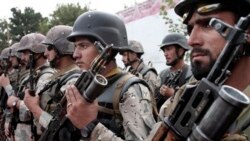In his annual State of the Union Address, President Barack Obama announced that the U.S. will withdraw 34,000 troops from Afghanistan by this time next year. In the coming months, said President Obama, "our forces will move into a support role, while Afghan security forces take the lead."
Even as U.S. troops draw down, they will continue to train, advise, and assist Afghan forces. In that capacity, the U.S. will no longer be leading combat operations, but a sizeable number of U.S. forces will provide support for two additional fighting seasons before Afghans forces are fully responsible for their own security.
"Beyond 2014, America’s commitment to a unified and sovereign Afghanistan will endure," said President Obama, "but the nature of our commitment will change. We’re negotiating an agreement with the Afghan government that focuses on two missions -- training and equipping Afghan forces so that the country does not again slip into chaos, and counterterrorism efforts that allow us to pursue the remnants of al Qaeda and their affiliates."
The United States also believes that Afghan-led reconciliation is the surest way to end violence and ensure lasting stability of Afghanistan and the region. The U.S. calls on the Taliban to join a political process. The end goal of any peace process must be for the Taliban and other armed opposition groups to end violence, break ties with al-Qaida, and accept Afghanistan's constitution, including its protections for the rights of all Afghan citizens.
Strengthening Afghan governance and economic development are also key to achieving a stable and peaceful Afghanistan. While Afghanistan has made economic progress in the past decade, the country will require substantial international assistance through the next decade to grow its private sector and promote integration into in greater South Asia's economy. The United States expects Afghan progress in fighting corruption, carrying out reform, and providing good governance as the international community provides support after 2014.
The United States is committed to an Afghanistan that can keep the peace, grow its economy and sustain its democracy.






